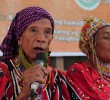So my emphasis has always been please give us support in terms of technical capacity for all of the defence forces, army, navy and air force. What we have done is to try and substantiate the notion of sovereignty in legal formal terms with real and effective capacity to interdict for all the leaders and the surveillance capacity that we work together with all the user states and the lateral states. What we lack in Indonesia is effective capacity to deploy resources, equipment, ships and men to provide that passage in the interests of Indonesia, in the interests of the little states and in the interest of the states of Northeast Asia.
We would like to appeal to China, Japan and South Korea to provide this technical assistance on an Asian-wide basis as well as a bilateral basis to the little states because as the Chinese have said over the past ten years, their predicament is the Malacca Straight predicament. So much of their oil, about 50 million barrels a day is required by China to fuel their 10% growth rate for the next couple of years, or all the oil from Africa will have to pass through the Straits of Malacca, the Straits of Indonesia and my colleague, the Defence Minister of India, yesterday called for cooperation with India and Asian, principally for guaranteeing the trade links between India and Southeast Asia. So we have a tremendous responsibility in Indonesia.
We are linking the � running with obsolete equipment, we are trying to develop a defence industry, cooperating with strategic partners, trying to establish joint production with China, with Korea, some of the countries in the region, would like to assure these countries, including our immediate neighbours, that there is no danger. Thank you.
Hermogenes Ebdane Jr
Ms Vuong, the status of visiting forces agreement between the Philippines and Australia defines the legal status of visiting forces and their proper basing or access agreement, and so far between the two countries allow us for the maturation of the longstanding and close relations between our two countries by defining common areas of interests, counter-terrorism, for and on behalf by the Minister for Defence, and it has to be ratified. Now we would like to make mention that insofar as the information sharing and the use of advanced facilities and equipment, we have the Cosworth[?] project in the south for which this is patterned on the system that Australia has and in coordination with Malaysia and Indonesia, we can provide better surveillance of that sea, along the boundaries.
Denny Blair[?]
I think we need to draw a couple of distinctions in this conversation between the different categories of maritime security that we are talking about, there really is no serious threat to the flow of big tankers through the Straits of Malacca from anyone but another nation state. These are huge ships. In normal conditions the pirates that come on them do nothing but go in and try to rob what they can from the crew and get off again. There is a potential terrorist threat, if a terrorist group were able to get hold of a large tanker right here off of Singapore and drive it into the port or into the refining areas, that would cause a huge destructive problem, but that is different from interrupting the flow of oil to Northeast Asia for which I see there is no really serious threat.
The concerns of the Northeast Asian countries are simply not that serious. I think the more difficult problem has to do with this set of problems that we talked about, about those who use the sea for illegal purposes running guns, running drugs, running people, stealing fish, exporting illegal logging and so on. That is the area that we can really cooperate on and we can really make some progress on. We talked about this mismatch between capacity of countries with huge coastlines like Indonesia and the Philippines and the lack of resources to be able to patrol them. The question really boils down to intelligence and surveillance cooperation, and that gets into the national sensitivity that Dr Fortuna mentioned.
The way forward really is to develop the joint intelligence cooperation and surveillance cooperation that will enable a selective use of ships and aircraft to intercept them that will eventually drive the outlaws off of the use of maritime forces. I am not on the inside any more, but my experience is that this is gradually getting better over the years, but it is the area that we really need to emphasise in order to make progress in this area. I would be interested, both in Minister Sudarsono�s and Minister Ebdane�s estimate off whether they feel that the intelligence exchange among the lateral nations that have to cooperate there is improving so that their limited resources can be used more effectively.










